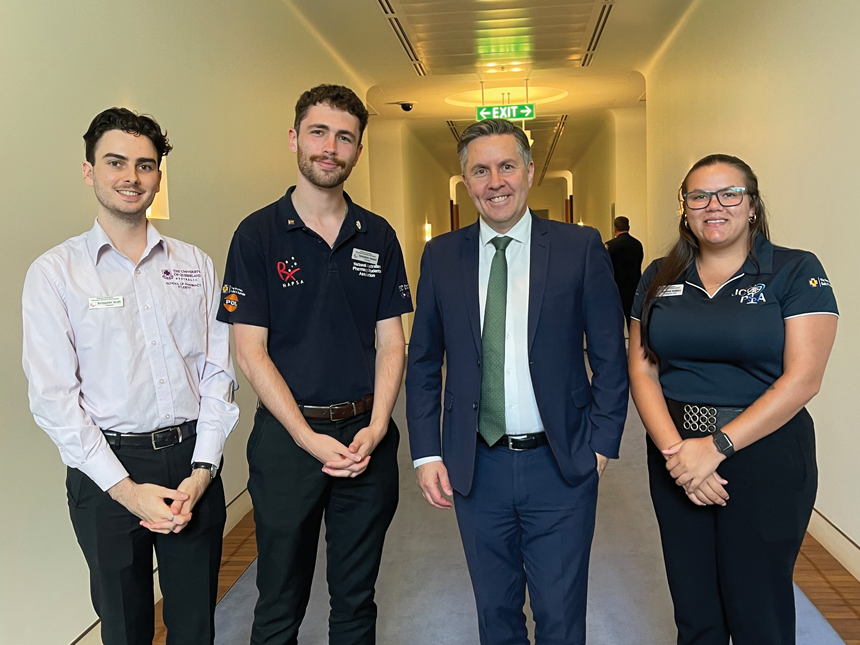While we’ve expanded the reach of NAPSA in campaigning and ensuring students have a seat at every table, the core objectives of the Association continue to be fulfilled by a national team invested in delivering outcomes.
While NAPSA Congress - our flagship national conference of students from across Australia and New Zealand - has its own history stretching back to 1952, the COVID-19 pandemic saw a hiatus in the holding of this event. Between Newcastle 2020 and Canberra 2023, pharmacy students missed out on the valuable opportunity to gather in one place. Since its return in 2023, NAPSA Congress continues to not just grow in number of delegates but become more refined and professional in its organisation. With preparations underway for the next iteration in January 2026, hosted by the Sydney University Pharmacy Association, the national body has crafted a solid formula to planning that will be appreciated by our delegates and sponsors.

This term has also been defined by a commitment to more initiatives and benefits for our members. It was a NAPSA/PGA scholarship to APP2023 in my second year of studies that not just showed me what the profession had to offer but introduced me to the leadership opportunities within NAPSA.
Confidently I can say without this scholarship, I would not be in the role I am today. More scholarships than ever before are being delivered by the Association, pushing more students to get involved, and see the place they have in the profession long before their studies conclude.
It was this mission to deliver real outcomes that gave way to the development of NAPSA 2030. The cornerstone of NAPSA’s vision for the next five years involved all levels of the Association. Through the work of our Board, Committee Chairs, their Team Members, local branches, and consultation with NAPSA’s alumni and stakeholders, NAPSA 2030 outlined not just the key priorities for this term, but the many national teams who will follow us.
Genuine advocacy to the decision-makers at the intersection of health and politics, equity for our most marginalised members, bringing NAPSA in line with the professional expectations placed on us as an Association and a Company, and reaching the students who are not yet members, are just some of the core elements of this vision.
Before NAPSA 2030 was released, we had already begun the work to realise this vision. With the announcement by the Minister for Health and Aged Care that students who graduate with a Master of Pharmacy (Extended) could use the qualification “Doctor of Pharmacy”, the Association was on the front foot with ensuring students are brought along for the journey. In advocating to the universities and peak organisations in pharmacy, NAPSA has continued to make the case that students are overwhelmingly excited by this development but need input to craft the best possible degrees. Students believe the integration of full scope into the new degree will deliver quality graduates that can meet the needs of a struggling healthcare system, and universities across Australia continue to listen to NAPSA and our local associations, in determining how they can deliver this.
As the profession listens and learns from students, it has been our mission to get the same respect from government. For some time, NAPSA and our colleagues across allied health have felt an issue only exacerbated by the cost-of-living crisis - placement poverty. When students are travelling across the country, paying out of their own pocket for accommodation while taking unpaid leave from work, and living with the reality of increased prices across the board, they fall into placement poverty.
Placements are a mandatory component of every health degree, and they enable us to become better graduates. But when students can't afford it, they are at risk of leaving pharmacy and allied health degrees altogether.
Armed with the belief that something must change, NAPSA built a coalition now of over 40 organisations representing pharmacy, physiotherapy, psychology, occupational therapy and other health disciplines. The Health Students Alliance has been actively campaigning to end placement poverty, with an intense focus during the 2025 federal election. With a re-elected Albanese Labor government that has committed to paying for the placements of teaching, nursing, midwifery and social work students, the Alliance is continuing the fight to get these payments expanded for our struggling health students. We are proud to have a strong relationship with the Minister’s office and look forward to keeping up this fight in the new term of government.










